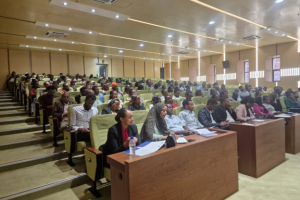
STEM (Science, Technology, Engineering, and Mathematics) education is a crucial focus within Ethiopia’s educational landscape. Recognized as vital means for equipping students with the skills and knowledge needed to thrive in these key fields, the Ethiopian government incorporated STEM education into the national education system about five years ago, acknowledging its role in driving economic growth and development.
Currently, the STEM field is attracting significant attention in education, and its impact is beginning to bear fruit though a lot remains ahead. As more students engage with STEM subjects, they are developing critical skills that contribute to personal growth and the broader societal advancements, paving the way for innovation and progress in various sectors.
A 2017 McKinsey Global Institute report suggests that the development and deployment of technology could create up to 50 million jobs globally by 2030. While the third industrial revolution reshaped how we live, work, and learn, the fourth industrial revolution, such as artificial intelligence and robotics, continues to redefine the nature of future occupations, making STEM education even more crucial.
To gain further insights, The Ethiopian Herald interviewed Tadesse Teressa, Physics subject Instructor and STEM-Desk Head at the Ministry of Education. Tadesse highlighted the growing importance of STEM skills in the rapidly evolving world.
Futurists worldwide agree that the workforce of the future will require skills that are often missing from traditional curricula. Abilities such as social and emotional intelligence, adaptability, creativity, collaborative problem-solving, perseverance, and resilience will become increasingly essential, as these qualities are key to thriving in a rapidly changing and unpredictable job market.
Hands-on, inquiry-based STEM education lays a strong foundation for social and emotional intelligence, boosting children’s confidence while enhancing their planning and reflective skills. With 70 percent of Ethiopia’s population being youth, there is a tremendous opportunity for national development, concerted and coordinated effort across various sectors.
Teressa further emphasized that in a world where technology is an integral part of every aspect of life, the significance of STEM education for children cannot be overstated. Through STEM programs, students can develop critical thinking and problem-solving skills, encouraging analytical thinking, the exploration of diverse solutions, and nurturing creativity. These competencies are essential for success in today’s dynamic and competitive landscape.
Moreover, STEM education enables young learners to connect classroom concepts with real-world applications, providing them opportunities to address tangible problems and making their education more relevant and engaging. It is crucial to prepare the future generations for technological advancement, as STEM skills are sought after fields in the job market. The Ministry of Education recognizes the importance of introducing STEM concepts early to equipping children with the foundational knowledge necessary for careers in engineering, computer science, and healthcare.
Initially piloted, STEM initiatives are now formally structured within the Ministry of Education. The Ministry is actively working to promote STEM both within the educational framework and the broader community through a variety of strategies. STEM centers have been established in 43 higher education institutions, providing training for students in higher education as well as those in grades 7-12. These centers also offer summer camps to engage and inspire young learners.
While the strategy is commendable, several challenges persist. A primary obstacle is the ambivalent attitude toward STEM among certain leaders and community members, which hampers broader acceptance and support. Additionally, there is a need for skilled personnel, resources, and infrastructure. Although the STEM framework operates at the Ministry level, it lacks adequate support at lower administrative tiers, he added.
Teressa remarked that efforts to enhance STEM education in Ethiopian schools encounter challenges both within and outside the classroom. A perceived scarcity of STEM resources, coupled with inadequate training on children’s developmental learning progressions, often leaves educators uncertain about their roles. The success of STEM programs hinges on setting clear expectations, implementing effective methods to measure progress, and fostering collaboration across grade levels.
To address these challenges, the Ministry is raising awareness and organizing national science fairs, which have successfully sparked interest and engagement among communities and leaders. The events, in turn, have led to the emergence of numerous innovators and problem solvers, fostering a culture of creativity and collaboration in STEM fields across the country.
The Ministry also organizes STEM awareness initiatives for younger students through workshops, competitions, and hands-on activities, sparking early interest in these fields. Additionally, specialized training programs for educators are being implemented to enhance teaching methodologies in STEM subjects, ensuring access to resources despite shortages. Collaborations with organizations such as JICA (Japan International Cooperation Agency) and STEM Synergy Ethiopia are also underway to improve access to STEM education, share technological expertise, and provide skilled personnel to further strengthen the STEM landscape in Ethiopia.
Development in the education sector is crucial for national growth. While Ethiopia has made commendable strides, achieving the desired progress requires a concentrated focus on STEM education. To fully realize its potential, attention to this area must go beyond conventional approaches. Embracing innovative strategies that foster critical skills and prepare future generations for the challenges ahead is imperative, according to him.
Investing in STEM education will not only address the demand for skilled labor but also foster economic stability, positioning Ethiopia as an attractive destination for investment. To catch up with other African nations like Kenya and Rwanda, significant advancements in the STEM sector are essential. The Ministry of Education is actively implementing reforms with the goal of ensuring that STEM receives the focus and resources it deserves.
Community Engagement and Indigenous Knowledge Desk Head at the Ministry Selam Alemu emphasized that STEM should not be perceived solely as an advanced technological approach. Effective STEM education requires understanding how to integrate core concepts into age-appropriate activities, particularly for young learners. Everyday items can be utilized to enhance students’ skills and knowledge, making learning more accessible and relevant to their everyday experiences.
According to her, the Ministry is working in collaboration with universities, regional education bureaus, and stakeholders at all levels to develop STEM education policies and strategic plans. This collaborative effort, as she stated, aims to ensure that STEM education is more effective and aligned with the needs of the evolving job market. “It is high time to revise the curriculum and frame STEM in a more productive and impactful way than ever before,” she remarked.
According to the UN, STEM education is crucial for addressing global challenges, driving innovation, and promoting sustainable development. In the same way, UNESCO highlights its importance for economic and social transformations in Africa, emphasizing its potential to reshape both education systems and the labor market.
Additionally, STEM education equips students with the skills needed to tackle pressing issues such as climate change, ensure food insecurity and address other similar pressing global concerns, driving them to be key problem-solvers in the future.
BY MENGISTEAB TESHOME
THE ETHIOPIAN HERALD TUESDAY 20 MAY 2025




